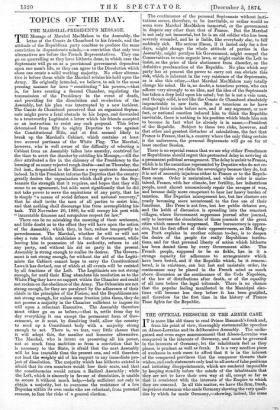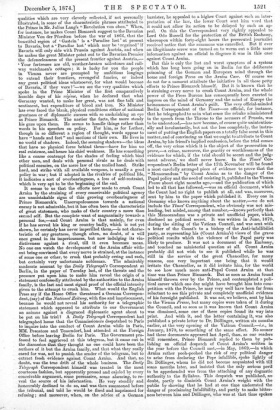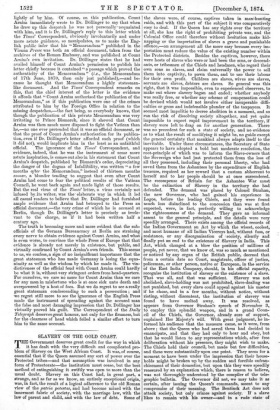THE 01 11CLIL PRESSURE lN THE ARNIM CASE.
IT is more like old times to read Prince Bismarck's frank and,
from his point of view, thoroughly statesmanlike speeches on Alsace-Lorraine and its deliberative Assembly. The undis- guised and even eager announcement that Alsace-Lorraine was conquered in the interests of Germany, and must be governed. in the interests of Germany, let the inhabitants feel as they please, is prudent as well as frank. It is a very needless piece of weakness in such eases to affect that it is in the interest of the conquered provinces that the conqueror thwarts their wishes, and such statements only lead to all sorts of false positions and irritating disappointments, which are rendered impossible by keeping steadily before the minds of the inhabitants that they are not to have their own way at all, except so far as that is consistent with the interests of the Empire to which they are annexed. In all this matter, we have the firm, frank, imperious statesman who made Germany showing the very quali- ties by which he made Germany,—showing, indeed, the same qualities which are very cleverly reflected, if not personally illustrated, in some of the characteristic phrases attributed to the Prince in Mr. Julius Lang's "Revolution von oben." When, for instance, he makes Count Bismarck suggest to the Bavarian Minister Von der Pfordten before the war of 1866, that the beautiful region of Gastein ' is a 'Paradise lost' at present to Bavaria, but a 'Paradise lost' which may be ' regained ' if Bavaria will only side with Prussia against Austria, and when he makes the great Minister point out to the Bavarian Premier the defencelessness of the present frontier against Austria,— ' Your fortresses are old, weather-beaten milestones and rail- way watchmen's cottages ; it is lucky for you the people in Vienna never are prompted by ambitious longings to extend their frontiers, revengeful fancies, or indeed any great political ideas whatsoever, for what would become of Bavaria, if they were? '—we see the very qualities which spoke in the Prime Minister of the first comparatively
humble days of his re'gime, when he declared that what
Germany wanted, to make her great, was not fine talk and sentiment, but expenditure of blood and iron. No Minister has ever faced the blank, physical conditions either of national greatness or of diplomatic success with so unshrinking an eye as Prince Bismarck. The nastier the facts, the more steady his gaze upon them. He seems to handle things rather than words in his speeches on policy. For him, as for Luther, though in so different a region of thought, words appear to have "hands and feet" and motions of their own. He lives in no world of shadows. Indeed, the seeming shadows—the ideas that have no physical force behind them—have for him no real existence, and hence his chief weakness. He has something like a coarse contempt for the shades of feeling which bind other men, and deals with personal rivals as he deals with political enemies, on the mere law of the mailed hand. Strike hard, and strike with all available weapons, is usually a good policy in war ; but if adopted in the rivalries of political life, it indicates a sort of overbearingness, a loss of self-restraint, which is very apt to be the beginning of the end. It seems to us that the efforts now made to crush Count Arnim by the straining of every conceivable political agency are unmistakable signs of this growing overbearingness of Prince Bismarck's. Unscrupulousness towards a national enemy is not admirable, but it has often been the characteristic
of great statesmen, who make of their country a more than second self. But the complete want of magnanimity towards a
personal foe,—and Count Arnim is that mainly, for even if he has served his king or country badly, which is not yet shown, he certainly has never imperilled them,—is not charac- teristic of any greatness, though often, no doubt, of a will once grand in its imperiousness, but now indulging its vin- dictiveness against a rival, till it even becomes mean. No one can watch the development of the Arnim affair with- out being convinced that every nerve is strained, at the instance of some one or other, to crush that probably erring and rash, but certainly very unfortunate nobleman. The admirably
moderate account by the Daily Telegraph's Correspondent at Berlin, in the paper of Tuesday last, of the threats and the
pressure put upon him to make him reveal the origin of a statement confessedly attributed by the authorities to the Arnim family, is the last and most signal proof of the official intensity given to the attempt to crush him. What would the English
Press say if the Home Office threatened a German Correspon- dent, (say) of the National Zeitung, with fine and imprisonment, because he would not reveal his authority for a telegraphic
statement which appeared to attribute to our Government an animus against a disgraced diplomatic agent about to
be put on his trial? A Daily Telegraph Correspondent had telegraphed home that the Commissioners deapatched to Paris to inquire into the conduct of Count Arnim while in Paris,
MM. Pescatore and Tessendorf, had attended at the Foreign Office before leaving Berlin for Paris. The Government pro- fessed to feel aggrieved at this telegram, but it came out in the discussion that they thought no one could have been the authors of it but the Arnim family, and that what they really cared for was, not to punish the sender of the telegram but to
extract fresh evidence against Count Arnim. And ;hat, no doubt, was the true drift of the whole business. The Daily Telegraph Correspondent himself was treated in the most courteous fashion, but apparently pressed and cajoled by every conceivable argument, some persuasive, some alarming, to re- veal the source of his information. He very steadily and honourably declined to do so, and was then summoned before the tribunal, and told he would be fined and imprisoned for refusing ; and moreover, when, on the advice of a German
barrister, he appealed to a higher Court against such an inter- pretation of the law, the lower Court sent him word that it could not allow its action to be delayed by such an ap- peal. On this the Correspondent very rightly appealed to Lord Odo Russell for the protection of the British Embassy,
whereupon within forty-eight hours the persecuted journalist received notice that the summons was cancelled. But if ever an illegitimate screw was turned on to worm out a little more information against an official in disgrace it was in this Case against Count Arnim.
But this is only the last and worst symptom of a system which has long been going on in Berlin for the deliberate poisoning of the German and European mind through the home and foreign Press on the Arnim Case. Of course we do not for a moment attribute the initiative in all these petty efforts to Prince Bismarck himself. But it is known that he is straining every nerve to crush Count Arnim, and the whole power of the Press Bureau has consequently been exerted to impress on the mind of Germany and the mind of Europe the
heinousness of Count Arnim's guilt. The very official-minded Berlin Correspondent of the Times--so official, for instance,
that he telegraphed to us in what sense the rebuke administered in the speech from the Throne to the accusers of Prussia, was to be understood,—has now become, of course quite unintention- ally and involuntarily, but not the less completely, the instru- ment of putting the English papers on a totally false scent in this matter, and of convincing us that we ought to attribute to Count Arnim, by his friend's implied confession, before the trial comes off, the very crime which it is the object of the prosecution to prove,—a crime, moreover, the gravity or worthlessness of the
evidence for which, if the trial should be secret and the judg- ment adverse; we shall never know. In the Vines' Cor- respondent's Berlin letter of the 17th November will be found
a most carefully arranged piece of evidence to prove that the " Memorandum " by Count Arnim as to the danger of the
Papal policy and the need of resisting it, published in the Vienna Presse about eight months ago,—and the publication of which
led to all that has followed,—was an official document, which the Count had no right to publish at all, and was, moreover, sent by him to the paper which published it. Every one in
Germany who knows anything about the matter,—we do not include the Times' Correspondent, who obviously was not mis-
leading, but misled, among that number,—knows perfectly that this Memorandum was a private and unofficial paper, which disclosed no political secret. It was written in June, 1870,, during the sitting of the Vatican Council, and was sent with a letter of the Count's to a bishop of the Anti-infallibilist party, as representing his (Count Arnim's) views of the grave political results which the violence of the Papal party was likely to produce. It was not a document of the Embassy, and touched no ministerial question at all. Count Arnim probably did not wish to see it published while he was still in the service of the great Chancellor, for many reasons, one very important one being that it would irritate the Chancellor, as it did irritate him, for the world to see how much more anti-Papal Count .Arnim at that time was than Prince Bismarck. But as soon as Arnim found himself thrown over by the Prince, and contemplated a poli- tical career which one day might have brought him into com- petition with the Prince, he may very well have been far from reluctant to see this private and completely unofficial evidence
of his foresight published. It was not, we believe, sent by him to the Vienna Preen, but many copies were taken of it during
the Council, and so soon as it was known that Count Arnim was dismissed, some one of these copies found its way into print. And with it, and the letter containing it, was also published a private letter to Dr. Malinger, written six months earlier, at the very opening of the Vatican Council,—i.e., in January, 1870, to something of the same effect. No sooner had these documents appeared last April, than, as our readers will remember, Prince Bismarck replied to them by pub- lishing an official despatch of Count Arnim's written in the year before the Council met,—in May, 1869,—in which
Arnim rather pooh-poohed the risk of any political danger to arise from declaring the Pope infallible, spoke lightly of
Dr. Dollinger, whom he did not become acquainted with till some months later, and insisted that the only serious peril to be apprehended was from the attaching of any dogmatic authority to the Syllabus. This despatch was published, no doubt, partly to diminish Count Arnim's weight with the public by showing that he had at one time underrated the danger of proclaiming Infallibility, and partly to make bitter- ness between him and Dollinger, who was at that time spoken
lightly of by him. Of course, on this publication, Count Arnim immediately wrote to Dr. Dollinger to say that when he drew up this despatch he was not personally-acquainted with him, and it is Dr. DoRinger's reply to this letter which the Times' Correspondent, obviously involuntarily and under more astute guidance, so manipulates, as to make the Eng- lish public infer that his " Memorandum " published in the Vienna Presse was both an official document, taken from the archives of the Roman Embassy, and was published at Count Arnim's own invitation. Dr. Dollinger states that he had availed himself of Count Arnim's permission to publish his letter chiefly because it contained "a passage which proved the authenticity of the Memorandum" (i.e., the Memorandum of 17th June, 1870, then only just published),—and be- cause he thought that Memorandum a highly statesman- like document. And the Times' Correspondent remarks on this, that the chief interest of the letter is the evidence it affords that "Count Arnim authorised the publication of the Memorandum," as if this publication were one of the crimes attributed to him by the Foreign Office in relation to the missing despatches,—the fact being, as everybody knows, that though the publication of this private Memorandum was very irritating to Prince Bismarck, since it showed that Count Arnim was then much more disposed to fight the Vatican than he,—no one ever pretended that it was an official document, or that the proof of Count _Arnim's authorisation for its publica- tion, even if Dr. Dellinger's letter afforded such proof (which it did not), would implicate him in the least as an unfaithful official. The ignorance of the Times' Correspondent, and evidence, indeed, that he was the instrument of some more astute inspiration, is comes out also in his statement that Count Arnim's despatch, published by Bismarck's order, depreciating the danger of the dogma of Infallibility, was written "a few months after the Memorandum," instead of thirteen months sooner, a blunder tending to suggest that even after Count Arnim had come to fear the political results of the Vatican Council, he went back again and made light of those results. But the real virus of the Times' letter, a virus certainly not infused by_its writer, was • the' elaborate way in which it led all casual readers to believe that Dr. Dollinger had furnished ample evidence that Arnim had betrayed to the Press an official document,—the very crime of which he is accused at Berlin, though Dr. Dollinger's letter is precisely as irrele- vant to the charge, as if it had been written half a century ago.
The truth is becoming more and more evident that the sub- -officials of the German Bureaucracy at Berlin are straining every nerve to obtain evidence against Count Arnim, and what is even worse, to convince the whole Press of Europe that that evidence is already not merely in existence, but public, and virtually confirmed by Count Arnim's own friends. This seems to us, we confess, a sign of no insignificant importance that the great statesman who has made Germany is losing the equa- nimity as well as the wisdom by which he made it. The vin- dictiveness of the official feud with Count Arnim could hardly be what it is, without very stringent orders from head-quarters. For ourselves, we care no more for Count Arnim than we care for any man in misfortune who is at once sick unto death and overpowered by a host of foes. But we do regret to see a really great statesman condescending to such a persecution ; and we regret still more to see the ignorance of the English Press made the instrument of spreading against the accused man the false and most damaging impression that Dr. Dollinger has virtually proved his guilt. The Correspondent of the Daily Telegraph deserves great honour, not only for the firmness, but for the clearness of head which foiled a similar effort to turn him to the same account.




































 Previous page
Previous page